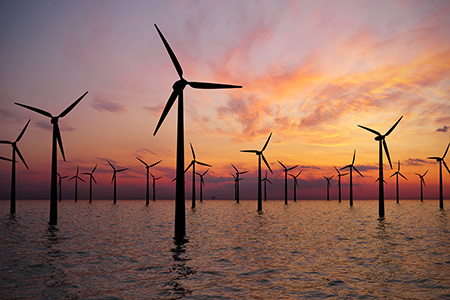Researchers from the University of Limerick (UL) have developed a robotic solution for inspecting floating offshore wind farms.
The remotely operated vehicle developed by UL has been successfully tested on WindFloat Atlantic, the world’s first semi-submersible floating offshore wind farm, and the results will help prepare for the maintenance challenges of these structures.
The intervention, repair and maintenance study was conducted by a team from UL’s Center for Robotics and Intelligent Systems (CRIS).
Regular inspection and maintenance are essential for offshore wind farms, whether fixed-bottom or floating, and currently these tasks rely primarily on human intervention. However, as the industry grows and advances, there is an increased focus on improving reliability and reducing operational costs.
The team surveyed Ocean Winds’ WindFloat Atlantic, off the coast of Portugal, using a fleet of in situ robots, subsea remotely operated vehicles (ROVs) and unmanned aerial vehicles (UAVs).
This provided UL researchers with a unique opportunity to carry out inspection work on a fully operational floating offshore wind farm and test the technology in real-world conditions.
The survey produced high-resolution, georeferenced 3D models of above- and below-water structures. The datasets and findings will be made publicly available through gold open access articles and proceedings to benefit the general public, academia and government.
Professor Daniel Toll, co-director of UL CRIS, said: “The importance of our research should be seen in the context of Ireland’s existing offshore wind strategy, which aims to achieve 37GW of offshore renewable energy capacity by 2050, which also includes plans for 6GW of floating offshore wind farms on the west coast and in the Shannon estuary.”
“Achieving this goal will require developing intervention, repair and maintenance capabilities to ensure offshore operations are efficient and cost-effective,” Professor Toll added.
The tests were carried out as part of the ATLANTIS project to test marine technology solutions for the inspection of offshore wind structures and funded by the Sustainable Energy Agency Ireland’s (SEAI) Robotics for Wind Farms project.
As the majority owner, developer and operator of the WindFloat Atlantic floating offshore wind farm, Ocean Winds is a key testing partner in the ATLANTIS project and is the home of innovative solutions and pilots. MaREI, Science Federation Ireland’s (SFI) Energy Climate and Marine Research and Innovation Centre, also supported the research.
One of the challenges in inspecting floating turbines is the movement of the structure, an effect that the UL team was able to minimize by using an adaptive control system for the remotely operated vehicle and customized machine vision algorithms used in image post-processing.
Dr. Phillipe Santos, CRIS lead scientist in charge of the trials on WindFloat Atlantic, commented: “CRIS is developing incredible robotic capabilities that can transform the way we inspect offshore wind farms. We’re really proud of the results we’ve achieved in these trials and believe this is just the beginning of a groundbreaking partnership.”
“Our goal is to continually innovate and develop robotics technologies that increase efficiency, reduce costs and, above all, improve safety by minimizing the need for human workers to operate in hazardous conditions.”
José Pinheiro, Ocean Winds’ Country Manager for Southern Europe and Project Director for WindFloat Atlantic, concludes: “At Ocean Winds, we are excited to support the University of Limerick in testing their remotely operated vehicles with our operational project. These efforts are essential to developing the floating offshore wind sector to commercial scale as well as continually improving operational and maintenance strategies for bottom-fixed installations. This collaboration will not only drive innovation but also set a precedent for implementation in other countries and projects.”
For more news and technical articles from the global renewable energy industry, check out the latest issue of Energy Global magazine: Energy Global Summer 2024 Issue
The Summer 2024 edition of Energy Global kicks off with guest comments from Terrawatt on Italy’s streamlining of permitting processes, before moving on to Frost & Sullivan’s regional report on the Asia-Pacific energy landscape. The issue covers key topics including wind farm vessels, offshore wind turbine fundamentals, weather analysis and solar PV maintenance.
The article can be read online: https://www.energyglobal.com/wind/01082024/university-of-limerick-researchers-announce-robotic-solution-for-floating-wind-maintenance/

